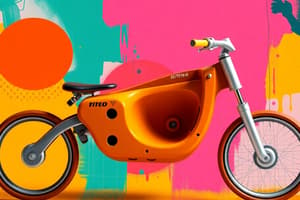Podcast
Questions and Answers
What is the purpose of a design brief?
What is the purpose of a design brief?
- To create a prototype of the design
- To outline the problem a design will solve (correct)
- To define the target customers for the design
- To detail what the design will look like
What does 'functionality' refer to in design?
What does 'functionality' refer to in design?
- The target market for the design
- The cost-effectiveness of production
- The ability of a product to perform its intended task well (correct)
- The aesthetic appeal of the design
Which term describes a group of people a company aims to sell its products to?
Which term describes a group of people a company aims to sell its products to?
- Prototype evaluators
- Target customer (correct)
- Client
- Design team
Which of the following materials is classified as a softwood?
Which of the following materials is classified as a softwood?
What is a prototype in design?
What is a prototype in design?
What is the function of a laser cutter?
What is the function of a laser cutter?
What does concept sketching involve?
What does concept sketching involve?
Which material is often used for low-cost furniture?
Which material is often used for low-cost furniture?
What is the goal of the process of evaluating a design?
What is the goal of the process of evaluating a design?
What describes a design specification?
What describes a design specification?
What does the term 'multifunctional' refer to in design?
What does the term 'multifunctional' refer to in design?
What does evaluating a design nvolve?
What does evaluating a design nvolve?
Which tool is commonly used to shape acrylic materials?
Which tool is commonly used to shape acrylic materials?
What is the primary focus of concept sketching?
What is the primary focus of concept sketching?
Which material is NOT typically used for outside purposes?
Which material is NOT typically used for outside purposes?
Who is considered the client in a design project?
Who is considered the client in a design project?
What is a prototype primarily used for in design?
What is a prototype primarily used for in design?
What does 'aesthetics' refer to in the context of design?
What does 'aesthetics' refer to in the context of design?
What type of wood is often used for making high-quality furniture and exterior doors?
What type of wood is often used for making high-quality furniture and exterior doors?
Which of the following materials is typically used in construction and is cheaper than solid wood?
Which of the following materials is typically used in construction and is cheaper than solid wood?
What kind of wood typically does not shed leaves annually?
What kind of wood typically does not shed leaves annually?
Which board type is known for being heavy and having low durability?
Which board type is known for being heavy and having low durability?
Which material is typically unsuitable for outdoor use?
Which material is typically unsuitable for outdoor use?
What is a characteristic feature of plywood?
What is a characteristic feature of plywood?
Which material is commonly utilized to create the structure of boat interiors when marine grade?
Which material is commonly utilized to create the structure of boat interiors when marine grade?
What type of material is primarily used for back panels of furniture or drawers?
What type of material is primarily used for back panels of furniture or drawers?
Which type of wood is a hardwood (from a tree shedding its leaves annually)?
Which type of wood is a hardwood (from a tree shedding its leaves annually)?
What is the primary use of the strip heater tool in design?
What is the primary use of the strip heater tool in design?
What is the main advantage of sustainable forestry?
What is the main advantage of sustainable forestry?
Which of these describes the purpose of a concept sketch?
Which of these describes the purpose of a concept sketch?
Which type of wood is an example of a softwood?
Which type of wood is an example of a softwood?
What does evaluate refer to in the context of design?
What does evaluate refer to in the context of design?
What is primarily used to engrave or cut materials with high precision?
What is primarily used to engrave or cut materials with high precision?
Which type of board is known for its strength and is suitable to build boats?
Which type of board is known for its strength and is suitable to build boats?
Which of the following is a feature of manufactured boards?
Which of the following is a feature of manufactured boards?
What defines the term 'aesthetics' in design?
What defines the term 'aesthetics' in design?
What role does a client play in a design project?
What role does a client play in a design project?
Flashcards are hidden until you start studying
Study Notes
Design Terminology
- Design Brief: A document that outlines the specific problem a design aims to solve.
- Design Specification: Details the criteria a product or design must meet, ensuring it fulfills intended functions.
- Client: The individual or entity purchasing the design project, influencing design decisions.
Design Elements
- Aesthetics: Refers to the visual appeal of a design, impacting how it is perceived.
- Functionality: Ensures that the product performs its intended purpose efficiently.
- Target Customer: The specific group identified as ideal consumers for the product.
- Multifunctional: A design that serves multiple purposes or can be used in various ways.
Design Development Tools
- Prototype: A singular model created to test and evaluate design concepts before mass production.
- CAD (Computer-Aided Design): Software-based tools like 2D Design and Onshape used for creating precise design drawings and models.
- Crating: A visualization technique where the object to be drawn is considered as encased within a box.
- Concept Sketching: Quick, informal drawings that capture the fundamental idea of a design proposal.
Evaluation and Sustainability
- Evaluate: Process of identifying both strengths and areas for improvement in existing or new designs.
- Sustainable Materials: Resources that can be replenished and manage resources effectively for future generations.
- Sustainable Forestry: Practices ensuring wood is sourced from renewable sources, balancing tree felling with replanting efforts.
Types of Wood and Boards
- Solid Wood: Strong and durable, commonly used in high-quality furniture and exterior doors.
- Manufactured Boards: Include various materials like particle boards and MDF, often cheaper and used for construction and furniture.
- Hardwood vs Softwood: Hardwoods (e.g., Oak, Beech) are typically deciduous, while softwoods (e.g., Pine) are conifers.
- Plywood: Strong choice suitable for various applications, including furniture and marine work.
- Chipboard: Low-cost material primarily used for affordable furniture, often veneered.
- MDF (Medium-Density Fibreboard): Stable and strong for indoor applications, ideal for shelving and furniture.
Tools for Design
- Laser Cutter: Precision machine that uses lasers to cut and engrave materials such as acrylic and plywood.
- Strip Heater: Tool used for shaping and bending plastic materials like acrylic at specific angles.
Design Terminology
- Design Brief: A document that outlines the specific problem a design aims to solve.
- Design Specification: Details the criteria a product or design must meet, ensuring it fulfills intended functions.
- Client: The individual or entity purchasing the design project, influencing design decisions.
Design Elements
- Aesthetics: Refers to the visual appeal of a design, impacting how it is perceived.
- Functionality: Ensures that the product performs its intended purpose efficiently.
- Target Customer: The specific group identified as ideal consumers for the product.
- Multifunctional: A design that serves multiple purposes or can be used in various ways.
Design Development Tools
- Prototype: A singular model created to test and evaluate design concepts before mass production.
- CAD (Computer-Aided Design): Software-based tools like 2D Design and Onshape used for creating precise design drawings and models.
- Crating: A visualization technique where the object to be drawn is considered as encased within a box.
- Concept Sketching: Quick, informal drawings that capture the fundamental idea of a design proposal.
Evaluation and Sustainability
- Evaluate: Process of identifying both strengths and areas for improvement in existing or new designs.
- Sustainable Materials: Resources that can be replenished and manage resources effectively for future generations.
- Sustainable Forestry: Practices ensuring wood is sourced from renewable sources, balancing tree felling with replanting efforts.
Types of Wood and Boards
- Solid Wood: Strong and durable, commonly used in high-quality furniture and exterior doors.
- Manufactured Boards: Include various materials like particle boards and MDF, often cheaper and used for construction and furniture.
- Hardwood vs Softwood: Hardwoods (e.g., Oak, Beech) are typically deciduous, while softwoods (e.g., Pine) are conifers.
- Plywood: Strong choice suitable for various applications, including furniture and marine work.
- Chipboard: Low-cost material primarily used for affordable furniture, often veneered.
- MDF (Medium-Density Fibreboard): Stable and strong for indoor applications, ideal for shelving and furniture.
Tools for Design
- Laser Cutter: Precision machine that uses lasers to cut and engrave materials such as acrylic and plywood.
- Strip Heater: Tool used for shaping and bending plastic materials like acrylic at specific angles.
Design Concepts
- Design Brief: Document outlining the specific problem a design aims to address.
- Design Specification: Details the criteria that a design or product must meet to be successful.
Key Roles
- Client: Individual or organization purchasing the design project.
Design Elements
- Aesthetics: Refers to the visual appeal of a design, influencing marketability.
- Functionality: Ensures a product operates as intended, fulfilling its purpose effectively.
Market Considerations
- Target Customer: The specific demographic or group the company intends to sell products to.
- Multifunctional: Describes products designed for multiple uses or functions.
Design Development
- Prototype: A unique sample created to test and evaluate design ideas prior to full-scale production.
- CAD (Computer-Aided Design): Software tools like 2D Design and Onshape streamline the design process.
Design Techniques
- Crating: Visualizing an object within a defined box for structured drawing.
- Concept Sketching: Fast, rough sketches that capture the core aspects of a design idea.
Evaluation and Sustainability
- Evaluate: Assessing strengths and identifying potential improvements in a design.
- Sustainable Materials: Resources that can be replenished, ensuring long-term availability for future generations.
Types of Wood and Boards
- Sustainable Forestry: Practices ensure wood is sourced from renewable forests, minimizing environmental impact.
- Solid Wood: Used in high-quality furniture and exterior doors, known for its durability.
- Manufactured Boards: Includes products like MDF and chipboard, generally more affordable and suitable for specific uses.
- Hardwood: Trees that shed leaves annually, producing sturdy materials like oak and beech.
- Softwood: Evergreens like pine, often used for construction and outdoor applications.
- Laminates: Often used as a surface finish for boards, enhancing durability.
- Particle Boards: Cost-effective but typically less durable, used in low-cost furniture.
- Fibreboards: Stable, strong materials ideal for indoor use and affordable furniture.
Tools and Machines
- Laser Cutter: Precision machine for cutting and engraving various sheet materials like acrylic and plywood.
- Strip Heater: Tool designed for shaping plastic materials, allowing bends and folds at precise angles.
Design Concepts
- Design Brief: Document outlining the specific problem a design aims to address.
- Design Specification: Details the criteria that a design or product must meet to be successful.
Key Roles
- Client: Individual or organization purchasing the design project.
Design Elements
- Aesthetics: Refers to the visual appeal of a design, influencing marketability.
- Functionality: Ensures a product operates as intended, fulfilling its purpose effectively.
Market Considerations
- Target Customer: The specific demographic or group the company intends to sell products to.
- Multifunctional: Describes products designed for multiple uses or functions.
Design Development
- Prototype: A unique sample created to test and evaluate design ideas prior to full-scale production.
- CAD (Computer-Aided Design): Software tools like 2D Design and Onshape streamline the design process.
Design Techniques
- Crating: Visualizing an object within a defined box for structured drawing.
- Concept Sketching: Fast, rough sketches that capture the core aspects of a design idea.
Evaluation and Sustainability
- Evaluate: Assessing strengths and identifying potential improvements in a design.
- Sustainable Materials: Resources that can be replenished, ensuring long-term availability for future generations.
Types of Wood and Boards
- Sustainable Forestry: Practices ensure wood is sourced from renewable forests, minimizing environmental impact.
- Solid Wood: Used in high-quality furniture and exterior doors, known for its durability.
- Manufactured Boards: Includes products like MDF and chipboard, generally more affordable and suitable for specific uses.
- Hardwood: Trees that shed leaves annually, producing sturdy materials like oak and beech.
- Softwood: Evergreens like pine, often used for construction and outdoor applications.
- Laminates: Often used as a surface finish for boards, enhancing durability.
- Particle Boards: Cost-effective but typically less durable, used in low-cost furniture.
- Fibreboards: Stable, strong materials ideal for indoor use and affordable furniture.
Tools and Machines
- Laser Cutter: Precision machine for cutting and engraving various sheet materials like acrylic and plywood.
- Strip Heater: Tool designed for shaping plastic materials, allowing bends and folds at precise angles.
Studying That Suits You
Use AI to generate personalized quizzes and flashcards to suit your learning preferences.




